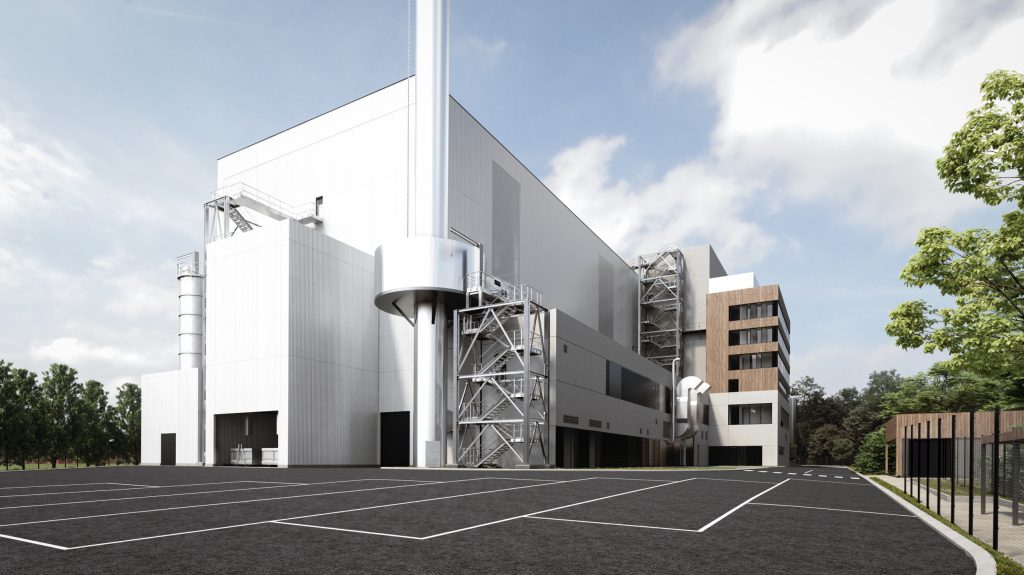Build started on plant ArcelorMittal Gent recovering energy from wastewater of 4 million inhabitants from 2027
From 2027, a new, state-of-the-art plant of water treatment company Aquafin at ArcelorMittal Belgium’s site in the port of Ghent will recover energy from the wastewater of 4 million inhabitants for reuse on site. Aquafin entrusted the design, build, financing, operation and maintenance of the plant to the BESIX-Indaver consortium. FOSTER, the ‘Special Purpose Vehicle’ (SPV) set up by Indaver and BESIX for this purpose, has now fully completed its finance package and has started construction, which will take just over two years.
Aquafin treats the domestic wastewater of 86% of residents in Flanders in 328 sewage treatment plants. In the biological purification process, microorganisms do the purification work, enabling continuous growth. The biomass created which then needs to be processed contains great potential for energy and raw materials. Aquafin has long been producing green energy and biomethane from the biogas derived from biomass fermentation. With its ‘road to zero carbon’ plan, the company aims to move further towards climate neutrality for its own business processes. With a negative global warming impact of 28,000 tonnes CO2-eq, the sludge mono-processor will make a significant contribution to that target. Moreover, in a mono-processor, sludge is not processed together with other substances, thereby allowing maximum recovery of energy and raw materials.
From design to operation
This DBFMO (design-build-finance-maintenance-operation) contract was awarded to FOSTER, which is responsible for operation until 2046. With the financial close of this project with an investment cost of around 200 million euros, FOSTER was able to fully complete the financing process and start engineering works. “We are honoured to play such an important role in this project as a long-term industrial partner,” said Pierre Sironval, BESIX Group CEO. “BESIX can bring decades of experience in public-private partnerships for infrastructure and environmental projects from design to implementation and operation. With this assignment, we show how we can provide our customers with sustainable solutions to help them achieve their climate goals. We are convinced that with our expertise we can guarantee efficient operation of the plant and thus contribute to sustainable development in Ghent for the next 20 years.”
Paul De Bruycker, CEO of Indaver: “This sludge processing plant offers a unique opportunity to further strengthen our commitment to the circular economy. Over the years, we have gathered extensive experience in building and operating thermal processing plants and setting up steam and heat networks. We will apply this expertise to the FOSTER plant in Ghent. By working with our partners Aquafin and BESIX to process the sludge of 4 million inhabitants, we can not only recover energy, but in the long run also enable the recovery of valuable raw materials like phosphorus. This fits perfectly with our mission to create maximum value for waste and close cycles in a high quality way.”
Site selection as a function of CO2-impact
For the location of the new sludge mono-processor, Aquafin chose the site of steel producer ArcelorMittal Belgium in the port of Ghent. “We based this on a model in which we could see for each possible location what the CO2 impact of all sludge transports in Flanders would be. Of course, we want our sludge to have to be driven as few kilometres as possible to its final destination,” Jan Goossens, CEO of Aquafin, explains this choice. “In addition, the value potential of the energy produced was also important, with a view to optimisation for Flanders. Ghent port’s ambition to become carbon-neutral by 2050 was an additional convincing factor.”
FINARMIT, 100% subsidiary of public renewable energy investor FINEG, will finance the expansion turbine that will accept and expand the steam. Filip Keppens, director FINEG: “FINEG’s mission is to actively contribute to the sustainability of Flemish industry by funding environmentally friendly energy solutions that generate both economic and environmental value. We are supporting ArcelorMittal Belgium in making its Ghent corporate site more sustainable through the SPV FINARMIT. The electricity that the expansion turbine will produce will be supplied to the sludge mono-processor and the expanded steam will be injected into Arcelor Mittal’s steam network. With the finance package, we are contributing to a significant reduction in the steel producer’s CO2 emissions.”
ArcelorMittal Belgium gives Aquafin a building right on the site and takes the entire steam production of the sludge treatment as an additional feed for the internal steam network. In this way, the plant also contributes to the steel producer’s sustainability strategy. Manfred Van Vlierberghe, CEO ArcelorMittal Belgium: “For us, it represents another step in our sustainability strategy towards carbon neutrality by 2050. Using steam in our steelmaking process further reduces the use of fossil fuels. This makes the plant an example of sustainable energy production in Europe.”
Phosphorus recovery also planned
From 2027, the sludge mono-processor will be responsible for the final treatment of two-thirds of the sludge from the treatment of household wastewater in Flanders. In a follow-up project, Aquafin also plans to start full-scale phosphorus recovery from sludge treatment fly ash with this plant. Phosphorus is an essential building block for all life. It is used in modern agriculture in the form of phosphate in fertilisers. Via human urine, it enters wastewater and from there into sewage sludge. By opting for mono-processing of sludge, phosphorus can be better recovered. This will make Flanders less dependent on foreign mining operations.



